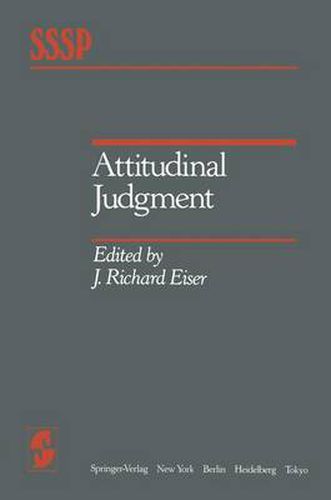Readings Newsletter
Become a Readings Member to make your shopping experience even easier.
Sign in or sign up for free!
You’re not far away from qualifying for FREE standard shipping within Australia
You’ve qualified for FREE standard shipping within Australia
The cart is loading…






This title is printed to order. This book may have been self-published. If so, we cannot guarantee the quality of the content. In the main most books will have gone through the editing process however some may not. We therefore suggest that you be aware of this before ordering this book. If in doubt check either the author or publisher’s details as we are unable to accept any returns unless they are faulty. Please contact us if you have any questions.
Despite the central place that the study of attitudes has long held in social psycho logical research, the last decade or so has been relatively quiet as far as the de velopment of attitude theory has been concerned. If one looks back to the Yale studies on communication and persuasion in the 1950s, followed by the massive literature derived from cognitive dissonance theory and its alternatives, there may be a temptation to think that the well of researchable questions has run almost dry. The purpose of this book is to convince the reader that this is not the case. On the contrary, a new look at the concept of attitude offers the prospect of as rich and varied a range of questions as ever before. The term new look is an old one in social psychology. It was used 30 to 40 years ago as the designation for the school of thought which held that basic psychological processes such as perception, cognition, learning, and memory could be influenced by attitudes, motives, and values. There are still lessons to be learned from that period, and the new new look that is now emerging incorporates some of these same themes, albeit in the context of changing issues and emphases.
$9.00 standard shipping within Australia
FREE standard shipping within Australia for orders over $100.00
Express & International shipping calculated at checkout
This title is printed to order. This book may have been self-published. If so, we cannot guarantee the quality of the content. In the main most books will have gone through the editing process however some may not. We therefore suggest that you be aware of this before ordering this book. If in doubt check either the author or publisher’s details as we are unable to accept any returns unless they are faulty. Please contact us if you have any questions.
Despite the central place that the study of attitudes has long held in social psycho logical research, the last decade or so has been relatively quiet as far as the de velopment of attitude theory has been concerned. If one looks back to the Yale studies on communication and persuasion in the 1950s, followed by the massive literature derived from cognitive dissonance theory and its alternatives, there may be a temptation to think that the well of researchable questions has run almost dry. The purpose of this book is to convince the reader that this is not the case. On the contrary, a new look at the concept of attitude offers the prospect of as rich and varied a range of questions as ever before. The term new look is an old one in social psychology. It was used 30 to 40 years ago as the designation for the school of thought which held that basic psychological processes such as perception, cognition, learning, and memory could be influenced by attitudes, motives, and values. There are still lessons to be learned from that period, and the new new look that is now emerging incorporates some of these same themes, albeit in the context of changing issues and emphases.